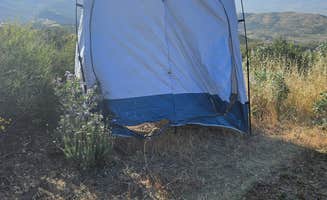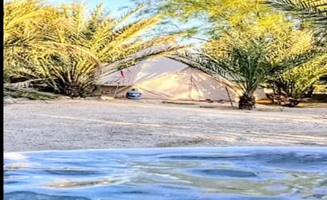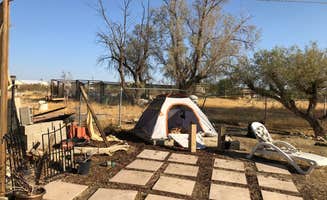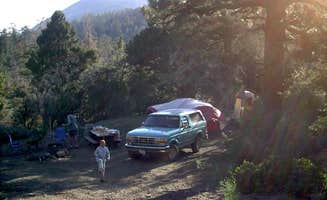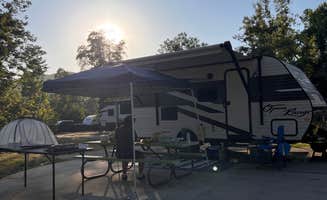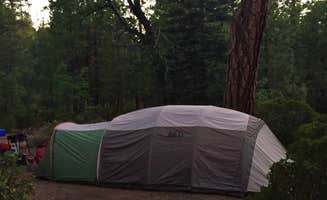Tent camping in Whitewater, California positions adventurers at elevations ranging from 2,000 to 11,500 feet across diverse ecological zones. The region experiences dramatic temperature variations with summer days often exceeding 100°F in lower elevations while higher camps remain 30-40 degrees cooler. Winter brings snow to camps above 8,000 feet, with many backcountry sites inaccessible from November through April.
What to do
Hike to summit views: From Dry Lake Backpacking Campground, adventurous hikers can summit Southern California's tallest peak. "If you can get out here right after a good rain/snow storm passes through, you will not regret it. It's a pleasant hike to the campground, there's tons of trees around the lake," notes Daniel J.
Wildlife observation: Quiet tent campers at Halfway Camp often encounter deer in the evenings. "We did have a momma deer and two does in the distance. Then 30 mins later we had another deer friend that just hung around until after we took shelter in the tent," reports Brittany N.
Night sky viewing: The elevation and distance from light pollution make many sites excellent for stargazing. At Thomas Hunting Grounds Yellow Post Sites, campers enjoy stellar views. "Beautiful views of the mountains, and the bird's eye view of the city of San Bernardino was definitely breathtaking," writes Nora S.
What campers like
Mountain temperature relief: During scorching summer months, higher elevation sites provide natural air conditioning. "We stayed at the round valley campground in March of this year. There was still some snow and it was beautiful. We took the tram up from palm springs and backpacked to the campground before summiting up San Jacinto peak," shares Katie O.
Water resources: Some backcountry sites offer natural water sources, though reliability varies seasonally. At Little Round Valley Campground, Jonathan G. notes, "We did it in late August, and there was still water running in the stream across from the camp."
Solitude and privacy: The dispersed nature of backcountry tent sites provides separation from other campers. At Tamarack Valley Campground, Taylor explains, "We stayed at group sites and man, it was unreal. We came here once a month last year and had the time of our lives."
What you should know
Permit requirements: Most wilderness sites require advance permits with specific regulations. For Round Valley Campsite, Cody B. advises, "Reservations go fast so you need to submit your permit starting 8 weeks before your trip, however waiting until 4 weeks may be too late."
Access challenges: Many sites require significant hiking with elevation gain. "This is a backcountry, backpacking campground. Only accessible by foot... 5.1 miles with 2,200' of elevation gain to get to the base of the lake," explains Brittany N. about Dry Lake Backpacking Campground.
Extreme temperature fluctuations: Higher elevation camps can be surprisingly cold, even in warm months. "Although it was May and the weather was beautiful at sea level, it was cold up here! There was snow on the ground but the air was the coldest I've ever felt," warns Kate W.
Tips for camping with families
Consider Yucaipa Regional Park: For tent camping with children, this developed campground offers more amenities. "Great tent camping facilities, privacy from neighbors, access to Zanja Peak Trail head, 3 lakes for fishing, water park during the summer, and friendly helpful staff," states Bryan H.
Plan for weather preparation: Families should bring clothing for all conditions. At Tool Box Springs Yellow Post Campground, Kyle M. advises, "Just got back this past weekend and the service road to get up was absolutely covered in mud and snow."
Choose vehicle-accessible sites: For camping with children, yellow post sites with vehicle access may be easier than backcountry options. "The yellow post campsites of Little Thomas are free and offer very minimal amenities. Depending which site you have there's a picnic table. It's also only a 15 min drive to Idyllwild which makes it a great place if all the campgrounds are full," recommends Shannon C.
Tips for RVers
Limited RV options near wilderness: Most backcountry camping around Whitewater is tent-only, but Yucaipa Regional Park accommodates RVs. "Excellent campground. Well maintained. Large concrete pads that can handle any rig. So much to do all around a park," notes Paul C.
Seasonal considerations: RVers should check weather conditions before traveling. "Does get very cold, was in the teens overnight when I was there in Feb. Fires allowed which is nice," warns Paul C. about winter camping at Yucaipa Regional Park.
Utility connections: Full hookup sites are rare in the region but available at select locations. "Full hookup. Some sites have better shade than others. I'm here in the heat but my AC is keeping up," reports Anneliese S.


